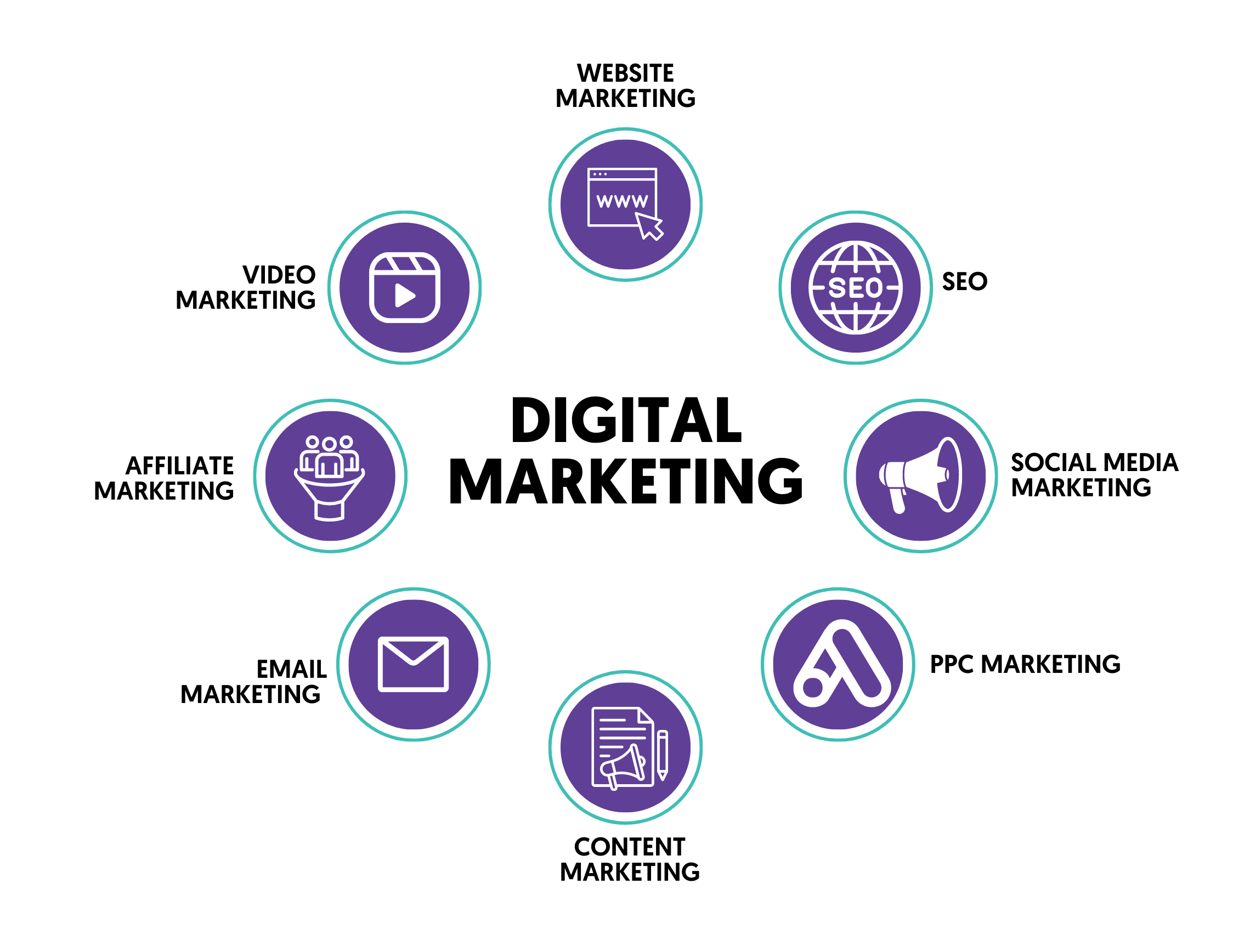Digital Marketing Course

The Digital Marketing course is a comprehensive program designed to equip students, entrepreneurs, job seekers, and marketing professionals with in-demand digital skills. This practical, hands-on training provides a deep understanding of the online marketing ecosystem and empowers learners to plan, execute, and analyze digital campaigns across multiple channels. The course is ideal for anyone looking to grow a business, promote a brand, or pursue a career in digital marketing.
1. Introduction to Digital Marketing
The course begins with an overview of the digital marketing landscape, its evolution, current trends, and how it differs from traditional marketing. Learners explore core concepts such as inbound vs. outbound marketing, the digital marketing funnel, and customer journey mapping.
2. Website Planning and Creation
A website is the foundation of digital presence. In this module, students learn how to plan, structure, and design a website using platforms like WordPress. Key topics include domain registration, hosting, CMS basics, UI/UX fundamentals, and mobile optimization.
3. Search Engine Optimization (SEO)
SEO is a critical skill for driving organic traffic. Learners are introduced to on-page SEO (keywords, meta tags, content optimization), off-page SEO (backlinks, social bookmarking), and technical SEO (sitemaps, crawlability, speed optimization). The module also includes keyword research tools and SEO performance tracking.
4. Search Engine Marketing (SEM) & Google Ads
This module focuses on paid advertising through Google Ads. Students learn how to set up and manage PPC campaigns, including keyword bidding, ad creation, Quality Score, and performance metrics like CTR and conversions. Google Ads account structure and budget allocation are also covered.
5. Social Media Marketing (SMM)
Students learn how to create and manage business profiles across platforms like Facebook, Instagram, LinkedIn, Twitter, and YouTube. The module covers content planning, community engagement, ad creation, campaign targeting, and analytics. Influencer marketing and trend-based marketing strategies are also discussed.
6. Content Marketing
This module emphasizes the power of storytelling and value-driven content. Learners explore content types (blogs, videos, infographics, ebooks), content calendars, and content distribution channels. Emphasis is placed on aligning content with audience needs and business goals.
7. Email Marketing
Students learn to build and segment email lists, design engaging email templates, automate campaigns, and track open rates, click-through rates, and conversions using tools like Mailchimp or Sendinblue.
8. Affiliate and Influencer Marketing
This module introduces affiliate program structures, platforms, and tracking systems. Students also learn how to collaborate with influencers to drive brand awareness and sales through social media and blogs.
9. Web Analytics
Using Google Analytics, learners track user behavior, measure traffic sources, set goals, and analyze key metrics. This data-driven approach enables better decision-making and campaign refinement.
10. Online Reputation Management (ORM)
Students learn how to monitor and manage brand perception online by responding to reviews, engaging customers, and using tools like Google Alerts and Social Mention.
Book Free Demo Class Now!
What You Will Learn?
Introduction to Digital Marketing
Overview, importance, digital vs. traditional marketing, career scope.
Website Planning and Creation
Domain, hosting, WordPress setup, website structure, mobile optimization.
Search Engine Optimization (SEO)
On-page, off-page, and technical SEO, keyword research, link building.
Search Engine Marketing (SEM) / Google Ads
Paid campaigns, ad types, keyword bidding, Quality Score, ad performance.
Social Media Marketing (SMM)
Facebook, Instagram, LinkedIn, Twitter, YouTube marketing & ad campaigns.
Content Marketing
Content strategy, blogging, video marketing, content calendars, storytelling.
Email Marketing
Campaign creation, list building, segmentation, automation, analytics.
Affiliate Marketing
Affiliate networks, tracking, commission models, choosing the right partners.
Influencer Marketing
Collaboration strategies, identifying influencers, campaign execution.
Web Analytics (Google Analytics)
Traffic analysis, user behavior, conversion tracking, custom reports.
Online Reputation Management (ORM)
Brand monitoring, review management, social listening tools.
E-commerce Marketing
Product listings, SEO for e-commerce, remarketing, conversion strategies.
Mobile Marketing
SMS, push notifications, app marketing, geo-targeting.
Digital Marketing Strategy and Planning
Campaign planning, budgeting, goal setting, KPIs.
Tools and Platforms
Google Ads, Google Analytics, Canva, Mailchimp, SEMrush, Hootsuite.

